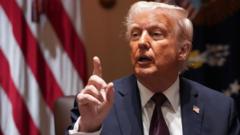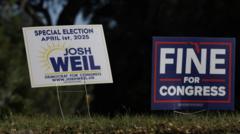During their first discussion since Carney took office, Trump and Carney addressed ongoing trade concerns, including impending tariffs that threaten Canada's automotive industry. While acknowledging the challenging dynamics, both leaders outlined plans for enhanced bilateral relations post-election.
Trump Acknowledges Canadian Sovereignty in Constructive Call with PM Carney

Trump Acknowledges Canadian Sovereignty in Constructive Call with PM Carney
In a recent conversation, U.S. President Donald Trump affirmed Canada’s autonomy when speaking with Prime Minister Mark Carney, setting the stage for future negotiations amid escalating trade tensions.
The conversation occurred against a backdrop of a contentious trade environment marked by Trump's proposed 25% tariff on vehicle imports set to take effect soon. Historically quick to reach out to their U.S. counterparts, the Canadian administration is now positioned to negotiate a fresh economic relationship following the approaching election, which may significantly affect trade strategies.
In the call, Carney, who is actively campaigning for election, appreciated Trump's acknowledgment of Canadian sovereignty as a shift from the president’s prior remarks, particularly towards former Prime Minister Justin Trudeau. Trump called the dialogue "very good," contrasting with his history of dismissive comments regarding Canada.
As tensions have already led to retaliatory tariffs exceeding $60 billion imposed by Canada against the U.S., Carney emphasized the possibility of further measures if Trump proceeds with the planned tariffs. The economic impact could be substantial, risking approximately 500,000 jobs in the Canadian auto sector, which is critical to the nation's economy.
Political rivals, including Conservative leader Pierre Poilievre, criticized the Liberal government for their handling of the trade dispute, claiming it has favored Trump's agenda over Canadian interests. Meanwhile, other party leaders, such as Yves-François Blanchet from the Bloc Québécois, voiced concerns over Canada’s susceptibility to U.S. pressures, highlighting the complexities of international relationships on the campaign trail.
Trump also issued warnings against Canada collaborating with the EU in response to U.S. tariffs, suggesting that such actions could provoke further punitive measures against Canadian products, potentially exacerbating the trade conflict.
As the Canadian election approaches, the discourse around U.S.-Canada relations and economic policy remains a pivotal issue for voters, shaping the future of this critical partnership.
In the call, Carney, who is actively campaigning for election, appreciated Trump's acknowledgment of Canadian sovereignty as a shift from the president’s prior remarks, particularly towards former Prime Minister Justin Trudeau. Trump called the dialogue "very good," contrasting with his history of dismissive comments regarding Canada.
As tensions have already led to retaliatory tariffs exceeding $60 billion imposed by Canada against the U.S., Carney emphasized the possibility of further measures if Trump proceeds with the planned tariffs. The economic impact could be substantial, risking approximately 500,000 jobs in the Canadian auto sector, which is critical to the nation's economy.
Political rivals, including Conservative leader Pierre Poilievre, criticized the Liberal government for their handling of the trade dispute, claiming it has favored Trump's agenda over Canadian interests. Meanwhile, other party leaders, such as Yves-François Blanchet from the Bloc Québécois, voiced concerns over Canada’s susceptibility to U.S. pressures, highlighting the complexities of international relationships on the campaign trail.
Trump also issued warnings against Canada collaborating with the EU in response to U.S. tariffs, suggesting that such actions could provoke further punitive measures against Canadian products, potentially exacerbating the trade conflict.
As the Canadian election approaches, the discourse around U.S.-Canada relations and economic policy remains a pivotal issue for voters, shaping the future of this critical partnership.























